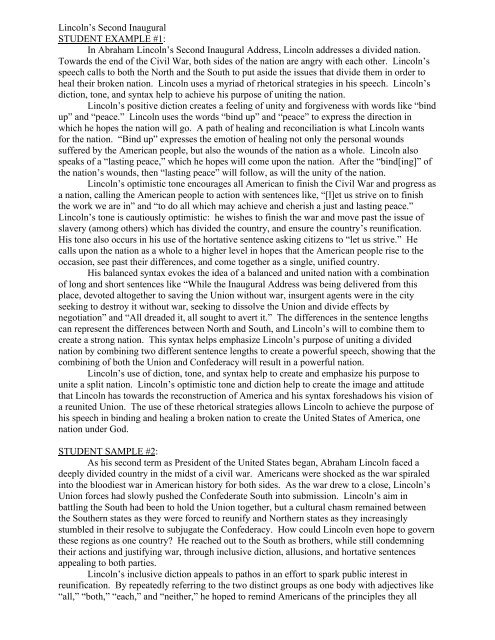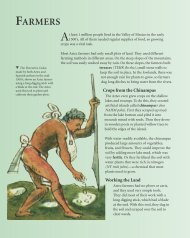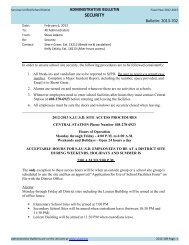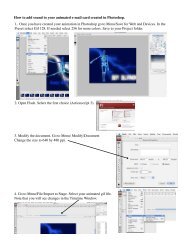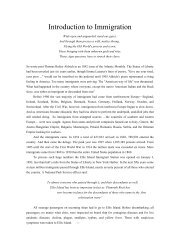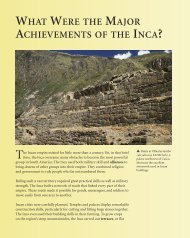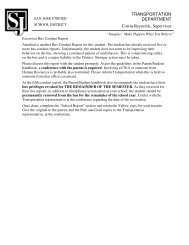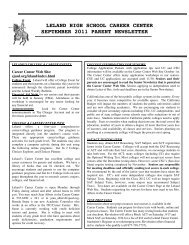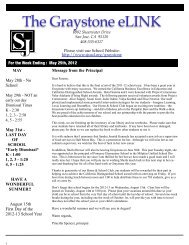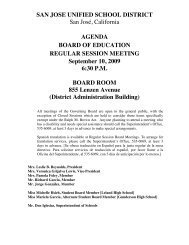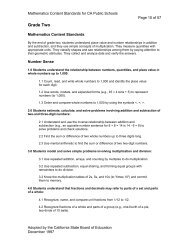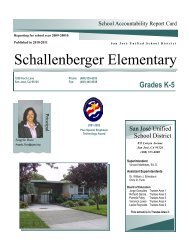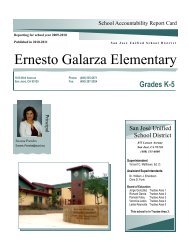Lincoln's Second Inaugural STUDENT EXAMPLE #1: In Abraham ...
Lincoln's Second Inaugural STUDENT EXAMPLE #1: In Abraham ...
Lincoln's Second Inaugural STUDENT EXAMPLE #1: In Abraham ...
Create successful ePaper yourself
Turn your PDF publications into a flip-book with our unique Google optimized e-Paper software.
Lincoln’s <strong>Second</strong> <strong><strong>In</strong>augural</strong><br />
<strong>STUDENT</strong> <strong>EXAMPLE</strong> <strong>#1</strong>:<br />
<strong>In</strong> <strong>Abraham</strong> Lincoln’s <strong>Second</strong> <strong><strong>In</strong>augural</strong> Address, Lincoln addresses a divided nation.<br />
Towards the end of the Civil War, both sides of the nation are angry with each other. Lincoln’s<br />
speech calls to both the North and the South to put aside the issues that divide them in order to<br />
heal their broken nation. Lincoln uses a myriad of rhetorical strategies in his speech. Lincoln’s<br />
diction, tone, and syntax help to achieve his purpose of uniting the nation.<br />
Lincoln’s positive diction creates a feeling of unity and forgiveness with words like “bind<br />
up” and “peace.” Lincoln uses the words “bind up” and “peace” to express the direction in<br />
which he hopes the nation will go. A path of healing and reconciliation is what Lincoln wants<br />
for the nation. “Bind up” expresses the emotion of healing not only the personal wounds<br />
suffered by the American people, but also the wounds of the nation as a whole. Lincoln also<br />
speaks of a “lasting peace,” which he hopes will come upon the nation. After the “bind[ing]” of<br />
the nation’s wounds, then “lasting peace” will follow, as will the unity of the nation.<br />
Lincoln’s optimistic tone encourages all American to finish the Civil War and progress as<br />
a nation, calling the American people to action with sentences like, “[l]et us strive on to finish<br />
the work we are in” and “to do all which may achieve and cherish a just and lasting peace.”<br />
Lincoln’s tone is cautiously optimistic: he wishes to finish the war and move past the issue of<br />
slavery (among others) which has divided the country, and ensure the country’s reunification.<br />
His tone also occurs in his use of the hortative sentence asking citizens to “let us strive.” He<br />
calls upon the nation as a whole to a higher level in hopes that the American people rise to the<br />
occasion, see past their differences, and come together as a single, unified country.<br />
His balanced syntax evokes the idea of a balanced and united nation with a combination<br />
of long and short sentences like “While the <strong><strong>In</strong>augural</strong> Address was being delivered from this<br />
place, devoted altogether to saving the Union without war, insurgent agents were in the city<br />
seeking to destroy it without war, seeking to dissolve the Union and divide effects by<br />
negotiation” and “All dreaded it, all sought to avert it.” The differences in the sentence lengths<br />
can represent the differences between North and South, and Lincoln’s will to combine them to<br />
create a strong nation. This syntax helps emphasize Lincoln’s purpose of uniting a divided<br />
nation by combining two different sentence lengths to create a powerful speech, showing that the<br />
combining of both the Union and Confederacy will result in a powerful nation.<br />
Lincoln’s use of diction, tone, and syntax help to create and emphasize his purpose to<br />
unite a split nation. Lincoln’s optimistic tone and diction help to create the image and attitude<br />
that Lincoln has towards the reconstruction of America and his syntax foreshadows his vision of<br />
a reunited Union. The use of these rhetorical strategies allows Lincoln to achieve the purpose of<br />
his speech in binding and healing a broken nation to create the United States of America, one<br />
nation under God.<br />
<strong>STUDENT</strong> SAMPLE #2:<br />
As his second term as President of the United States began, <strong>Abraham</strong> Lincoln faced a<br />
deeply divided country in the midst of a civil war. Americans were shocked as the war spiraled<br />
into the bloodiest war in American history for both sides. As the war drew to a close, Lincoln’s<br />
Union forces had slowly pushed the Confederate South into submission. Lincoln’s aim in<br />
battling the South had been to hold the Union together, but a cultural chasm remained between<br />
the Southern states as they were forced to reunify and Northern states as they increasingly<br />
stumbled in their resolve to subjugate the Confederacy. How could Lincoln even hope to govern<br />
these regions as one country? He reached out to the South as brothers, while still condemning<br />
their actions and justifying war, through inclusive diction, allusions, and hortative sentences<br />
appealing to both parties.<br />
Lincoln’s inclusive diction appeals to pathos in an effort to spark public interest in<br />
reunification. By repeatedly referring to the two distinct groups as one body with adjectives like<br />
“all,” “both,” “each,” and “neither,” he hoped to remind Americans of the principles they all
shared. Lincoln’s passionate diction calls Americans together in defense of their ideals:<br />
although both parties “dreaded” and “deprecated” war, each tried to “[wring] their bread from<br />
the sweat of other men’s faces.” These emotional descriptions reflected the range of feelings<br />
Americans felt towards the war which had torn so many lives. Lincoln personifies the Union,<br />
characterizing the war as its struggle to “survive” or “perish.” This was an attempt to tie the war<br />
to more than a petty battle over a culture clash, but a second trial for the fledgling democracy<br />
mirroring the War of <strong>In</strong>dependence.<br />
Lincoln’s hortative sentences with parallel structure call on both sides to reunite as<br />
brothers. Lincoln calls upon American citizens with phrases like, “Let us strive on to finish the<br />
work we are in, to bind up the nation’s wounds, to care for him …, to do all which may achieve<br />
… peace.” The parallel structure of this suggestion (and others, such as “Let us judge not, that<br />
we be not judged”), reflect Lincoln’s desire that the warring regions share responsibility equally<br />
to rebuild the country. Antithesis such as the above quote and “one would rather make war than<br />
let the nation survive, and the other would rather accept war than let it perish” create an image of<br />
similarity in the face of the cultural and physical clashes between the North and South.<br />
Lincoln alluded to the common ground the regions share, especially religiously.<br />
Although he describes a “peculiar and powerful institution,” alluding to the common nickname<br />
for slavery, Lincoln states that “[b]oth read the same Bible and pray to the same God.” He<br />
elaborates using allusions to, and quotes from, the Bible, such as, “The judgments of the Lord are<br />
true and righteous altogether” and “Woe unto the word because of offenses.” These religious<br />
references linked the Union with the Confederacy, reminding them of their shared values and<br />
spiritual goals, rather than deep divisions.<br />
Lincoln attempted to create a spirit of national unity and forgiveness with his <strong>Second</strong><br />
<strong><strong>In</strong>augural</strong> Address.<br />
<strong>STUDENT</strong> <strong>EXAMPLE</strong> #3:<br />
Lincoln first ascended to presidential office on the eve of the Civil War. However, the<br />
state of the country upon his second election could not have been more different. After a long,<br />
brutal war, which was finally drawing to a close, Lincoln in his <strong>Second</strong> <strong><strong>In</strong>augural</strong> Address, chose<br />
instead of continuing the hatred and bitterness between the two sides, to call for unity. This<br />
moving speech makes use of parallelism and inclusive diction, appeals to common Christian<br />
values, and abounds with hortative syntax.<br />
Lincoln, through use of parallelism and inclusive diction, tries to evoke a sense of unity<br />
and of a common cause between the two bitterly conflicted parties. Lincoln uses parallelism to<br />
categorize the two parties as very similar, if not the same, when he states that “all dreaded it, all<br />
sought to avert it,” “one of [the parties] would make war rather than let the nation survive, and<br />
the other would rather accept war rather than let it perish,” and every drop of blood drawn with<br />
the lash shall be paid by another drawn with the sword.” All of these are examples of parallelism<br />
and serve to balance the two parties, and thus draw them together in the minds of the audience.<br />
Similarly, Lincoln uses inclusive diction, such as “both,” “all,” “neither party,” “each,” and “we”<br />
to once again bring to the audience’s minds the idea of the nation as a whole, soon to be reunited.<br />
Lincoln also appeals to common Christian values in order to demonstrate the values<br />
which the northerners and southerners have in common. Lincoln’s claim that “both read the<br />
same Bible and pray to the same God” demonstrates the shared ground of the two opposing<br />
sides. Lincoln also uses faith to justify the Union’s victory, as when he says that “He now wills<br />
to remove [slavery],” thus wiping away the need for bitterness and retribution, as God’s will has<br />
been done.<br />
Lastly, Lincoln uses hortative syntax to create a call for unity, especially as he concludes,<br />
“let us strive to finish the work we are in, to bind up the nation’s wounds, to care for him who<br />
shall have borne the battle and for his widow and his orphan.” With this ringing conclusion,<br />
Lincoln exhorts that the North, as victors, should no longer make war, but instead peace, and<br />
should care for those who have been harmed in the war.
President <strong>Abraham</strong> Lincoln led the United States through its bitterest and most costly war<br />
as Commander in Chief of the army. With a Union victory close at hand, he could have chosen<br />
to rain malice on the South, as punishment for the war, but instead, Lincoln, with this speech,<br />
chose to call for peace and “charity for all.”


